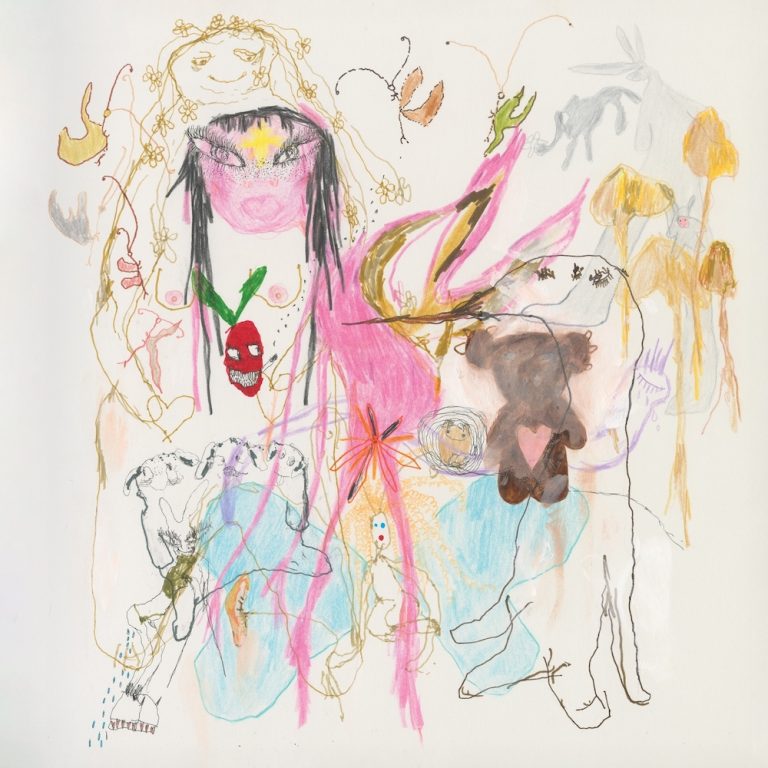At just 22, beabadoobee is a Gen-Z icon. The British/Philipino artist’s considerable oeuvre has seen her morph from twee bedroom popstar to hellraising grunge pastiche act in a heady few years. Tying these sounds together is melodic nous; an ability to create playful earworms out of both nylon-stringed strums and sugar-coated fuzz. Despite certain 80s influences, beabadoobee’s work oozes late 90s/early 00s nostalgia. Her second album, Beatopia, finds the artist in a surprisingly mellow mood, combining her acoustic roots with high production values.
Beatopia is a concept that has been silently formulating in the mind of Beatrice Kristi since she was seven years old, long before the adoption of the beabadoobee moniker. Once an imaginary world to escape into, the coping mechanism now exists in the form of introspective songwriting – something this album has in abundance. The actual world in which it was created, the locked-down Britain of 2020/21, could be a reason for this. With venues closed and group gatherings prohibited, there’s no doubt the climate favoured a modest approach.
Beatopia, however, is far from a solitary record and was written alongside live guitarist Jacob Bugden and a host of guests (high profile appearances include that of The 1975’s Matt Healy, and Black Country, New Road’s Georgia Ellery). Still, it rarely feels like the work of a rock band, differing from predecessor Fake It Flowers in that respect. Kristi’s distortion pedal is dusted down briefly for the gloriously brash, fuzz-laden lead single “Talk”, before being restored to the shelf.
In place of these rock numbers are various acoustic ballads and genre experiments, the most successful of which see Kristi veer into R’n’B territory. “Sunny Day” and “The Perfect Pair” are the best examples of this; the vocal harmonies of the former washing over a canvas of crunchy lo-fi drums and relaxed guitar plucks, the latter a bossa-nova tinged effort ending with a swell of strings. Kristi’s strong aesthetic can lead to her being pigeonholed, but it’s moments like these that prove she is capable of excelling in unexpected areas.
Another triumph comes in the form of the PinkPantheress collaboration “Tinkerbell is Overrated”. Beatopia’s theme of maturity culminates in this musical collage, as Kristi sheds her rockstar skin, adopting a glittery electronic indie-pop sound, driven by the arrival of a vivacious drum machine. Lines of earnest such as “I’m not a woman in my room / I’m just a girl instead” sit alongside the gleefully puerile hook: “Tinkerbell is super overrated”.
Unfortunately, these stylistic experiments don’t work every time, and after a promising opening of guitar interplay, “Pictures of Us”, featuring Matt Healy, drifts into a derivative midwestern emo bore. Presumably Healy’s voice does not gel with Kristi’s, as his vocals are kept extremely low in the mix, leading one to spend the majority of the song straining one’s ears and wondering: “is that Matt Healy?” It’s difficult to put into words how unnecessary his contribution is, failing to make “Pictures of Us” anything but the most bloated song on the album.
It’s a track that would benefit from some of the more fun, interesting ideas that are scattered throughout Beatopia. On “Don’t Get The Deal”, for example, pop-punk and the power of “Talk” are mixed with a sultry sensibility. As the song breaks into heavier sections a wave of muzak takes over, as if one has been put on hold by the world’s trendiest bank; a similar sound also appearing on “broken cd”. Elsewhere, the track “Fairy Song” submerges itself in a swamp of distorted bass and guitar squeals, before rising back above the surface to twinkle once more.
These instances succeed in exciting, though they aren’t without fault. As polished and competent as the production work is, it struggles at times to keep everything sounding coherent. And too often it feels as if that’s the goal; it’s a rare case of not seeing the trees for the wood. Rather than pushing each song to be the best it can be, the production is reigning them back in, adding particular sounds or utilising certain vocal effects to maintain a sense of unity. It’s understandable, but leaves one wondering whether these songs are fulfilling their potential.
Something that remains strong throughout, however, is Kristi’s voice. Her lyrical accounts of love and sense of self sound as good as ever on Beatopia. There are no conceited ad-libs or overweening displays of vocal range; Kristi remains crisp, able to convey confidence and vulnerability without arrogance, as she has done her entire career. It’s twee, cutesy even, but this restraint – or disinterest – prevents her from slipping into cheesy over-sentimentality. Just.
Beatopia lacks the edge and drive of its predecessor, yet several inspired moments are enough to maintain Kristi’s reputation as one of the nation’s most exciting young artists. Some of her best work can be found on this record, as well as some of her most lacklustre. Despite this, there’s a sense of palpable importance to the experimentation. In a few years, we could be regarding Beatopia as the first glimpse of an entirely new, successful direction for beabadoobee.

